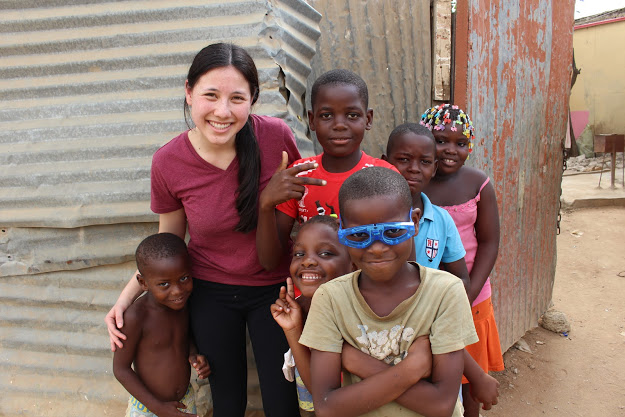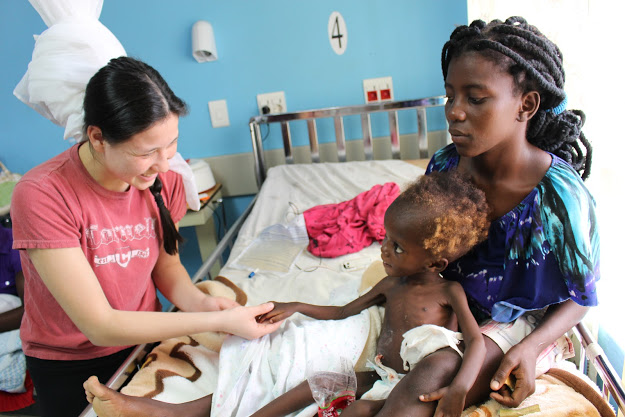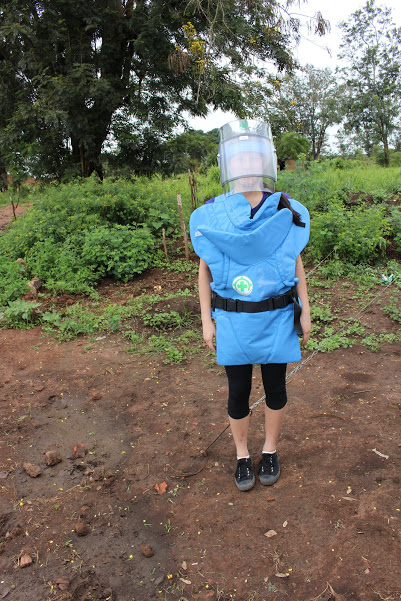My Trip to Angola
- Thursday, 26 March 2015 11:00
- Last Updated: Thursday, 26 March 2015 15:55
- Published: Thursday, 26 March 2015 11:00
- Caroline Kristof
- Hits: 6792
The author with children on the street in Luanda, Angola
When I first told my teachers a few weeks ago that I was missing school for a week to go to Angola, they were less upset than just highly confused, because—let's be real—who misses a week of school to go to Angola? Nonetheless, I assured them it would be a once-in-a-lifetime experience. But in reality I had no idea what Angola would be like. I imagined the capital, Luanda, to be filled with the usual developing world features—bustling streets, makeshift roads, overcrowded sidewalks, traditional music, and cheap goods. I consider myself fairly well-traveled, yet both the horrors and delights of Angola did not cease to leave a deep impression.
My dad and I arrived in Angola mid-afternoon, and the 80-degree weather was a nice shift from the spring snow showers of New York. As we bustled through the streets of downtown Luanda on the way to our hotel, the first thing I thought of was how guilty I felt about complaining about the potholes on Post Road, as the potholes here left me in a constant nauseating suspension above my seat. Yet our hotel was relatively close to the airport so nothing at first glance about the city really shocked me in any way, and I was just excited to get to the hotel to sleep, exhausted from over 20 hours of flying. When we got inside our hotel, I felt as though I had never left New York; the grand and immaculate lobby seemed all too upscale and out of place. When we got to the hotel dinner buffet, it was $75 per person; you could say I was just a tad shocked.
A girl recovering from malaria and hydrocephalus in Lubango
As we entered the first hospital we visited, just outside the city, I glimpsed a seemingly endless row of mothers cradling their sick babies, terrified, yet hopeful of what the next day may bring them. Some traveled hours to get there, scraping together their last savings, some even selling valuables in order to get transportation for this proper medical care. Unfortunately, these were the lucky ones as well—almost half of the population cannot access any kind of professional medical care their whole lives. Some mothers pointed me out to their children, as I waved, held out my hand, high fived, and laughed with them. One by one, a mother would be called up to see the doctor, so he could quickly stick in an IV, or hand over some pills, before moving on to the next child, possibly his hundredth in that day. I passed a young mother nursing her 11-month old baby boy, José, and enveloping him in blankets. She kept looking up, as if praying for a miracle. I smiled at her in an attempt to reassure her that José was strong, that he will fight through his deathly disease, and that she will one day be able to watch him grow up and become a man that she will be so proud to have raised. Across from José was a 2-year old girl, named Ana, who kept holding out her hand for me to hold. Whenever I turned away, she would call out to me so that we could continue laughing and high-fiving. Just as I was thinking about how adorable Ana was and how I wanted to take her home with me, I heard the shrill.
Kristof in safety gear in a trip to areas that had not been cleared of land mines.
The rest of the week brought more hospital visits, but also more optimism, as we journeyed across the country and tasted the unique culture and charm that the country had to offer. Though what I had witnessed earlier in the week still haunted me, it didn't define my trip, as there was another side to Angola. At one point we drove hours in our landmine-proof van on small side roads, through small rivers (this van endured a LOT), and up rocky slopes so we could try to visit some of the remote villages in the middle of nowhere. I met girls my age who were fun and bubbly, yet had never been to a day of school in their lives. Some of the villagers we came across had never heard of the United States, and had never been outside their village. One mother we met had had fifteen kids in total, and lost ten of them, yet could still have faith in God, and wanted to see her village thrive. I watched the young children run around, chasing their goats, and climbing their thatched roofs as a way to pass time, all giggling and getting along. It was a beautiful sight.
I had seen more in that week than I could have ever imagined, and my takeaway is easily indignation at the horrific corruption that is resulting in a horrific number of malnourished and diseased babies. But I will also always remember Ana, smiling as she reached out to hold my hand, and the village children laughing around in the midday African heat—both still able to find joy and purpose, in a life that has brought them too much misfortune and grief.

















